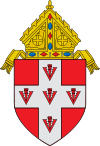Eusebius J. Beltran
Eusebius Joseph Beltran | |
|---|---|
| Archbishop Emeritus of Oklahoma City | |
| Archdiocese | Oklahoma City |
| Appointed | November 24, 1992 |
| Installed | January 22, 1993 |
| Retired | December 16, 2010 |
| Predecessor | Charles Alexander K. Salatka |
| Successor | Paul Stagg Coakley |
| Previous post(s) |
|
| Orders | |
| Ordination | May 14, 1960 |
| Consecration | April 20, 1978 by Charles Salatka, Thomas Andrew Donnellan, and Andrew Joseph McDonald |
| Personal details | |
| Born | August 31, 1934 |
| Motto | We are one in Christ |
| Styles of Eusebius Joseph Beltran | |
|---|---|
 | |
| Reference style | |
| Spoken style | Your Excellency |
| Religious style | Archbishop |
[1]Eusebius Joseph Beltran (born August 31, 1934) is an American prelate of the Roman Catholic Church. He served as archbishop of the Archdiocese of Oklahoma City in Oklahoma from 1993 until 2010. He previously served as bishop of the Diocese of Tulsa in Oklahoma from 1978 to 1992.
Beltran was ordained in 1960 and did pastoral and curial work in the Archdiocese of Atlanta until 1978. He also participated in the Selma to Montgomery marches in 1965 during the civil rights movement.
Biography
[edit]Early life
[edit]Eusebius Beltran was born on August 31, 1934, in Ashley, Pennsylvania, to Joseph and Helen (née Kozlowski) Beltran. His father was a Spanish immigrant and coal miner, who later died of black lung disease. The fifth of eight children, Beltran has two siblings who entered the religious life as well; one brother also became a priest and one sister became a nun, taking the religious name Sister Sponsa and working as a missionary in Liberia. Eusebius Beltran was raised in Wilkes Barre and attended Marymount School. He took the name Joseph as his confirmation name.[1]
After Beltran's father contracted Black Lung disease, he moved the family to Georgia in search of different employment. Aspiring to become a missionary, Eusebius Beltran became a seminarian for the Diocese of Savannah following his graduation from high school. Beltran returned to Pennsylvania for eight years, studying at St. Charles Borromeo Seminary in Philadelphia.[1]
Priesthood
[edit]Beltran was ordained to the priesthood by Bishop Francis Hyland on May 14, 1960, for the Diocese of Atlanta. Beltran then did pastoral and curial work in the Atlanta diocese (raised to archdiocese in 1962) until 1978. He attended the Second Vatican Council sessions in Rome during the early 1960s as a peritus to Archbishop Paul Hallinan. He also participated in the Selma to Montgomery marches in 1965 during the American civil rights movement. From 1971 to 1978, Beltran served as vicar general for the archdiocese.[1]
Bishop of Tulsa
[edit]On February 28, 1978, Beltran was appointed bishop of Tulsa by Pope Paul VI. He was consecrated on April 20 by Archbishop Charles Salatka, with Archbishop Thomas Donnellan and Bishop Andrew McDonald serving as co-consecrators. His mother, Helen, died shortly afterwards.[1]
Most notable among his charity work were his efforts to assist persons in need, including unwed mothers, HIV/AIDS victims, homeless families, and women who had just been released from prison.[1]
Archbishop of Oklahoma City
[edit]On November 24, 1992, Beltran was selected as archbishop of Oklahoma City by Pope John Paul II. He was installed on January 22, 1993. Beltran became the official publisher of the Sooner Catholic, a bi-monthly newspaper for Catholics in Oklahoma. Beltran's sermons were featured in each number of the newspaper during his reign.[1]
In 1999, Reverend James Francis Rapp was arrested and pleaded no contest to sexually abusing two boys in Duncan, Oklahoma. During a subsequent civil trial, it was discovered that Beltran knew about Rapp's prior history of abuse as early as 1994. Beltran received medical documents and psychiatric evaluations of Rapp that advised the priest should not be allowed to work with children.[2]
In 2009, Beltran expressed his opposition to President Barack Obama giving the commencement speech at and receiving an honorary degree from the University of Notre Dame in Notre Dame, Indiana, saying, "President Obama, by word and action, has approved of abortion and other atrocities against human life. Therefore he deserves no recognition at a Catholic institution."[3]
Retirement and legacy
[edit]Upon reaching his 75th birthday in 2009, Beltran submitted to the Vatican a letter of resignation as archbishop of Oklahoma City, as required by Catholic canon law. His request was accepted by Pope Benedict XVI on December 16, 2010, during a press conference at which his successor, Bishop Paul Stagg Coakley of the Diocese of Salina, Kansas, was introduced.[4]
See also
[edit]- Catholic Church hierarchy
- Catholic Church in the United States
- Historical list of the Catholic bishops of the United States
- List of Catholic bishops of the United States
- Lists of patriarchs, archbishops, and bishops
- Roman Catholic Church
- Roman Catholic Archdiocese of Oklahoma City
- Roman Catholic Diocese of Tulsa
- Sooner Catholic
References
[edit]- ^ a b c d e f g "Archbishop Emeritus - Biography of Archbishop Beltran". Archdiocese of Oklahoma City. Retrieved 2023-11-11.
- ^ Romano, Lois (May 21, 2002). "OKLA. ARCHBISHOP FAILED TO OUST PRIEST; LONG TRAIL OF ABUSE PROMPTS CRITICISM". Washington Post. Retrieved 2016-05-17.
- ^ Hinton, Carla (April 2009). "Speech by Obama faces Catholic foes in Oklahoma". The Oklahoman. Retrieved April 1, 2009.
- ^ Hinton, Carla (December 16, 2010). "Newly-named Oklahoma archbishop said he will 'eagerly embrace' his appointment". The Oklahoman. Retrieved December 16, 2010.
External links
[edit]- Homepage of the Archdiocese of Oklahoma
- Brief biography of Archbishop Beltran
- Homepage of The Sooner Catholic Online.
- Archive of Homilies of Archbishop Beltran
Episcopal succession
[edit]- 1934 births
- Living people
- People from Ashley, Pennsylvania
- American people of Spanish descent
- Roman Catholic bishops of Tulsa
- Roman Catholic archbishops of Oklahoma City
- 20th-century Roman Catholic archbishops in the United States
- 21st-century Roman Catholic archbishops in the United States
- Catholics from Pennsylvania


